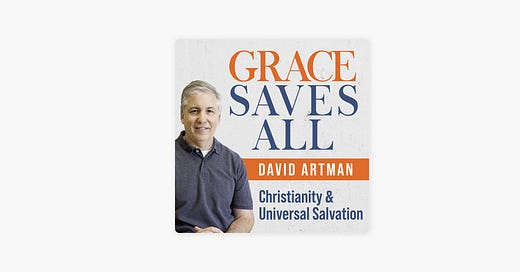Catholicism and Christian Universalism
I wanted to reshare a conversation I had last year with David Artman—on his podcast, Grace Saves All—about if there is space within orthodox Catholicism for universalism.
I made the case that a person can be within the bounds of Catholic orthodoxy and have a sure and certain hope that God will save everyone.
The Catechism says, “The Church prays that no one should be lost: ‘Lord, let me never be parted from you.’ If it is true that no one can save himself, it is also true that God ‘desires all men be saved’ and that for him ‘all things are possible’” (CCC 1058).
We know that God desires for all to be saved. And we know that grace can work in us, uninvited, to move our hearts and free our freedom, to dispose us to respond to God. Therefore, well we cannot deny that it is theoretically possible, it is infinitely improbable that someone could, at the end of the day, refuse God. Or, as St. Edith Stein says it:
"All-merciful love can thus descend to everyone. We believe that it does so. And now, can we assume that there are souls that remain perpetually closed to such love? As a possibility in principle, this cannot be rejected. In reality, it can become infinitely improbable—precisely through what preparatory grace is capable of effecting in the soul."
This is a not scientific or dogmatic presumption in universal salvation, nor is it an ethereal or vague hope, it’s a sure and certain hope founded on the character of God.
In the liturgical prayers of a Christian funeral, during the Prayer of Commendation at the end of the Mass, the priest prays over the body one last time (emphasis mine):
"Into your hands, Father of mercies,
we commend our brother/sister N.
in the sure and certain hope
that, together with all who have died in Christ,
he/she will rise with him."
St. Thomas Aquinas, in the section of the Summa about whether or not the wayfarer can be saved, said:
"Hope does not trust chiefly in grace already received, but on God's omnipotence and mercy, whereby even he that has not grace, can obtain it, so as to come to eternal life."
My hope doesn't ultimately rest in the fact I was baptized (grace received), it ultimately rests in who God has revealed himself to be, specifically, a God of power and mercy.
When I put these all together—that we ought to have sure and certain hope in the salvation of a baptized brother or sister AND that our hope in salvation doesn't ultimately rest in baptism but rather in who God has revealed himself to be, a God of mercy and power who wills for all to be saved—then I'm left concluding that I can have sure and certain hope in everyone's salvation.
In the podcast, I used an illustration that felt awkward, so I’ll use a different one here that I’m borrowing from Jordan Daniel Wood. If someone were to come up to me and tell me that my dad just murdered another person in cold blood in a neighboring town, could I know with scientific or dogmatic certainty that he didn’t? No. But I would still be sure and certain that he didn’t do it, because I know the kind of person my dad is, I know his character. This certainty wouldn’t be presumption, it would be trust in the kind of person I know my dad is.
My goal with this conversation was to demonstrate that there is space within the bounds of Catholic orthodoxy for this kind of sure and certain hopeful universalism. I hope I did that.
And it was great getting to know David Artman. He was a gracious interviewer and a lot of fun to talk with.
You can listen to the episode here, or search for it in your favorite podcast app:
*The podcast where I first heard Jordan Daniel Wood is The Particular Good podcast
**In the podcast I incorrectly referred to Gaudium et Spes when I meant Dei Verbum (specifically section 8)




